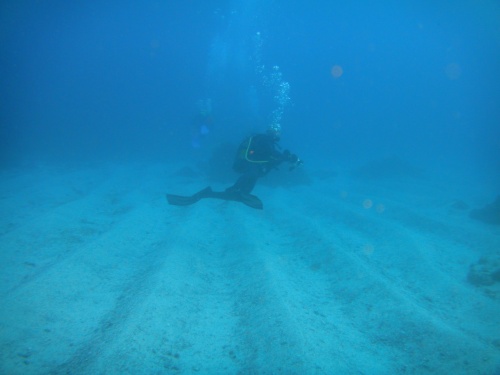There has raged a heated debate for a long time on the merits and dangers of solo diving. Solo diving is the as the title suggests, diving alone, no buddy, no surface support (if boat diving) and most likely no one waiting on the beach.
Very little solo diving takes place in a resort environment, primarily because they want a full boat before they launch. It’s not a common practice, most resort environments have heavy boat traffic as there are often many operators diving the same dive sites, these skippers look for a buoy close to a boat (the boats follow a surface buoy towed by the dive master), and skippers don’t really want divers scattered all over the ocean as it is hard to keep track of them. If the resort you are diving with has an anchored boat it is easier to do a solo dive especially if you loose the group as there is seldom a dive master thats going to come looking for you. You may be lucky to find a skipper that will drop you off separately from the group, but it is rare.
Cape Town is a little different. It is often a case where someone on the boat is doing a mapping project, or some research or looking for a specific feature underwater so solo diving happens. The skipper and sometimes other members of the group know you are down there but not where.
If you want to maximise the number of photos you get on a dive or get some good video footage then solo diving makes this easier. Not having a buddy means you do not need to check up on them, you do not need to periodically look for them and you wont have them yanking on your fin to show you something cool just as you are about to get that ”shot”. By the same token there is then no one looking for you, checking up on you and no one for you to signal ”out of air” for example.
If you are going to go solo diving start small, somewhere where the beach is close, the weather is good and someone knows where you are, how long you plan to dive and what your route will be. It is for some an intimidating experience and your comfort level takes a while to increase.
Once you decide to try solo diving be brutally honest with yourself: do you trust yourself, your equipment and your ability to think rationally in a stressful situation? If not, don’t try it.
If you are okay with all of these aspects make sure you have the right gear. Split your weights over a weight belt and integrated weights. You’ll need a knife, a compass, a dive computer, decent gloves, a hoodie and all the rest to ensure you don’t get cold, tired, uncomfortable or lost. Be sure you know when to turn the dive if you are swimming out somewhere and returning to the same spot. Ensure you plan and monitor your air consumption, checking more often because just knowing you are ”good on air” won’t help you if you have a leak on your first stage that no one tells you about… There is no one there remember. (If you think you have a leak, you can roll onto your back and look up and between breaths you will be able to see if you do.)
Plan your dive and dive your plan.



Leave a comment